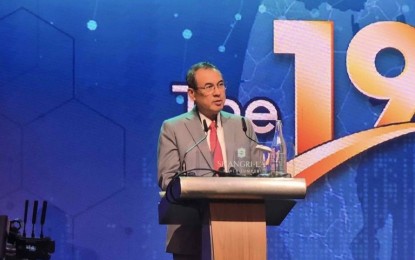
JUDICIAL LANDSCAPE. Chief Justice Alexander Gesmundo discusses the significant potential of Artificial Intelligence (AI) in assisting judges during his presentation at the 19th Conference of Chief Justices of Asia and the Pacific in Kuala Lumpur, Malaysia on Oct. 12, 2024. Gesmundo noted the transformative role of technology, particularly AI in reshaping the judicial landscape, but, however, cautioned against overreliance on AI. (Photo courtesy of the Office of the Chief Justice)
MANILA – Chief Justice Alexander Gesmundo has noted the transformative role of technology, particularly artificial intelligence (AI) in reshaping the judicial landscape but cautioned against overreliance on it.
Speaking before his fellow judiciary leaders at the 19th Conference of Chief Justices of Asia and the Pacific in Kuala Lumpur, Malaysia on Oct. 12, Gesmundo highlighted both the “opportunities and challenges” AI presents to deliver justice efficiently.
Gesmundo said AI has the “significant potential” to assist judges in streamlining administrative tasks, expediting legal research, and predicting judicial outcomes, the SC said in a news release on Sunday.
Citing examples from foreign jurisdictions, he noted that AI is already used in courts for tasks such as examining evidence and preparing case files.
He also discussed the Philippine Supreme Court’s innovations under the Strategic Plan for Judicial Innovations 2022-2027 (SPJI), its five-year reform agenda which incorporates AI-driven programs in court processes to improve efficiency and access to justice.
However, Gesmundo pointed out that while AI can enhance judicial processes, it lacks essential human qualities like empathy, ethical discretion, and the ability to adapt to societal changes – “elements crucial for ensuring that justice is not only administered efficiently but also fairly and compassionately.”
“AI should support judicial efficiency but never replace the human elements of justice. Courts should still be populated with human judges if we are to expect that empathy and compassion would still go into the consideration of granting equitable remedies,” Gesmundo said
He also underscored the moral responsibility of judiciary leaders to guide their institutions through these rapid technological changes.
Gesmundo concluded by emphasizing the courts’ role in ensuring that AI remains a tool for judicial efficiency without compromising the integrity and human-centric nature of justice. (PNA)
